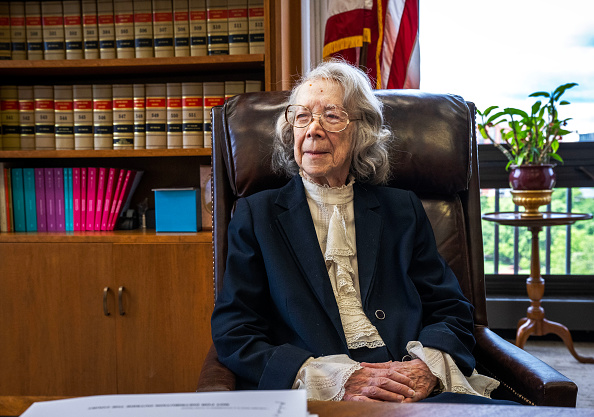Judiciary
Federal appeals judge, 98, plans to ‘continue the battle’ after panel recommends continued suspension

Judge Pauline Newman, now age 98, of the U.S. Court of Appeals for the Federal Circuit in May 2023. According to a three-judge special committee, Newman’s eloquent speaking ability and her doctors’ reports don’t justify her refusal to submit to neuropsychological tests. (Photo by Bill O’Leary/The Washington Post via Getty Images)
A federal appeals judge’s eloquent speaking ability and her doctors’ reports don’t justify her refusal to submit to neuropsychological tests, according to a three-judge special committee of the U.S. Court of Appeals for the Federal Circuit.
Federal Circuit Judge Pauline Newman, 98, should receive a third one-year suspension from hearing new cases, according to the special panel’s July 28 report and recommendation, which was noted by How Appealing.
Law360, Bloomberg Law and Reuters have coverage. Additional materials are available here.
Newman, who is appealing dismissal of her lawsuit challenging the suspension, told Reuters that she plans to “continue the battle.”
“I am concerned lest these travesties of procedure and law acquire precedential force, placing a cloud on any judge of divergent policy or politics or even a judge who writes dissents,” she told Reuters.
Newman was first suspended from hearing new cases in September 2023 for refusing to participate in medical evaluations to determine her mental fitness for the bench. The Federal Circuit’s judicial council at the time cited “overwhelming evidence that Judge Newman may be experiencing significant mental problems, including memory loss, lack of comprehension, confusion and an inability to perform basic tasks.”
In the new report, the panel noted that one of Newman’s doctors, Dr. Ted Rothstein, testified in a deposition that he had recommended during an examination in July 2023 that she undergo a more detailed neuropsychological battery of tests for a definitive determination on fitness for her duties.
“Years of litigating this dispute could have been avoided,” the panel said, if Newman had heeded that recommendation.
Another doctor for Newman also acknowledged that her examination did not include a fitness for duty examination.
A third doctor who examined Newman said a CT perfusion scan showed no cognitive impairment. But three experts retained by the panel said such tests are not an accepted diagnostic approach in the field.
The third doctor also said his expert testimony has never been excluded, but that’s not true, the special panel said. His expert testimony has been excluded by several courts, including on grounds that his opinions were too speculative and conclusory.
The panel also said medical records produced by Newman listed memory impairment on a problems list, without further explanation, and that she was hospitalized twice for fainting episodes.
The medical records list Newman’s law clerk as a point of contact, a caregiver and even her “legal guardian,” the report said. The clerk arranges and attends medical visits and provides much of the medical history, even when Newman is present. That clerk relied on the Fifth Amendment in response to nearly every question at her deposition.
When her law clerk was not present, Newman wrongly told one of her doctors that she was not admitted to the hospital four months prior for a fainting episode. A year later, she told another doctor that she never had a fainting episode.
Nor was the panel impressed by videos of interviews given by Newman.
“All of this information suggesting that Judge Newman is able to speak eloquently in limited scenarios does not overcome the overwhelming evidence indicating that further neuropsychological testing is warranted,” the special panel said. “Indeed, such an ability to produce fluid speech and apparently ‘normal’ cognition is to be expected, even if there are relevant cognitive disabilities, in a person, like Judge Newman, who is highly educated and had a particularly high cognitive ability to begin with.”
One of Newman’s lawyers, Gregory Dolin of the New Civil Liberties Alliance, a nonprofit public interest law firm, told Law360 that the panel delivered its opinion just days after hearing arguments.
“This is just a mockery of any sort of due process,” Dolin said.
Write a letter to the editor, share a story tip or update, or report an error.

